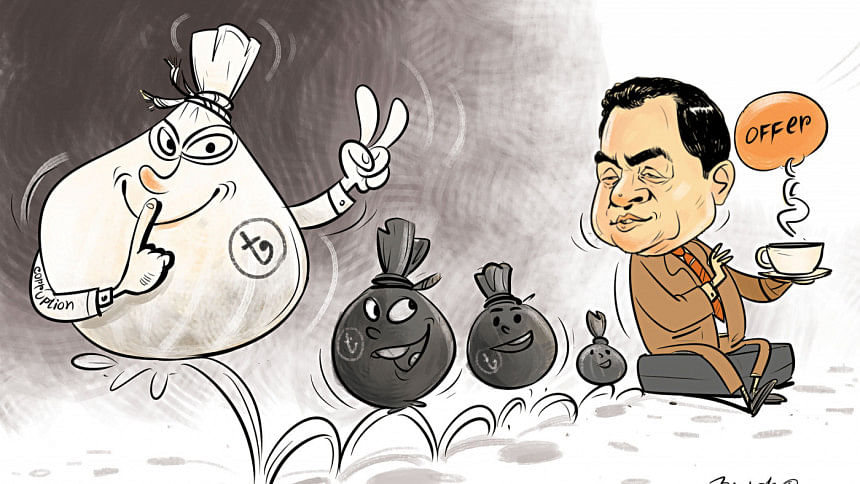Scope To Legalise Black Money Indefinitely: Kamal’s plan draws flak from economists

Economists yesterday lambasted Finance Minister AHM Mustafa Kamal for his plan to allow the black money whitening opportunity as long as undeclared liquidity exists in the country.
"This is a wrong statement and is completely devoid of ethics," said Ahsan H Mansur, executive director of the Policy Research Institute of Bangladesh, a think-tank.
"With the statement, the government is incentivising the public to go for the black money. What type of perception would it give about the government?"
Mustafizur Rahman, a distinguished fellow of the Centre for Policy Dialogue, echoed Mansur.
"Such comments disincentivise honest taxpayers. This means the government would not get the amount of tax it expects to get. It is not justifiable economically and is not morally acceptable."
Taxpayers legalised a record amount of assets worth Tk 14,295 crore in the first nine months of this fiscal year by showing their wealth in the form of cash, fixed deposit receipts, saving certificates and shares. The National Board of Revenue (NBR) got Tk 1,439 crore in taxes. Since independence, Tk 30,823 crore has been whitened, which fetched about Tk 3,900 crore for the state coffer.
Mansur asked why people would pay 30 per cent personal income tax when there was a scope to whiten the undeclared money by paying only 10 per cent. The money whitening facility did not give much yield in terms of tax generation.
"We have lost at least twice the amount we have collected."
Zahid Hussain, a former lead economist of the World Bank's Dhaka office, said that a dual taxation system was being created in the personal income tax because of the continuation of the black money provision.
Because of the whitening facility, a taxpayer has two options: they can pay the tax as usual. Or, they can wait until incomes become black and they pay the fine and whiten it.
Hussain said the black money whitening facility benefited the higher income group more than the low-income groups. People belonging to the high-tax rate bracket, especially those earning more than Tk 4 lakh a month, now have to 25 per cent in income tax.
"The money whitening opportunity allows the higher income groups to make a savings of 15 percentage points on their tax payment. It is a reward for them."
Thanks to the blanket immunity, taxpayers in the higher income groups might choose not to pay the tax at a 25 per cent rate now. They could wait until the income becomes black money, and then they will legalise it. Until they declare black money, they can even invest the cash and earn money.
Binayak Sen, director-general of the Bangladesh Institute of Development Studies, does not think that the facility yields any effective result.
He called for introducing an effective wealth tax, which would do away with the necessity to whiten the black money and generate more revenue than the facility produces.
Income is one aspect of black money. Wealth is another aspect because undeclared money is used to accumulate wealth such as properties, flats, land, factories, cars and other durable assets.
"So, we have to get to the root of the wealth," Sen said.
There is a surcharge on the wealth tax, but it has not been able to become a substitute for the wealth tax.
This is because there is a problem with the valuation of assets. If the valuation of the properties purchased in the 1980s is done on the price of four decades ago, it will not work because the property's price has gone up manifolds, according to Sen.
"An effective wealth tax would have ensured the valuation of properties at the current fair prices. This would have brought many people in Dhaka city under the coverage of the wealth tax."
He suggested collecting the statement on assets alongside the income statement. "Thus, the assets will come under monitoring and how they are accumulated, and tax would be generated in the form of wealth tax."
Mansur and Sen suggested the government allow the legalising of undeclared money after a long gap, as seen in many other countries, to enable the public to whiten accumulated undeclared incomes.
"If the facility is extended every year, it will lead to a collapse of the tax administration. This will impact the tax collection," said Mansur, a former economist of the International Monetary Fund.
He called for allowing legalising undeclared money at the payment of the full tax rate, the interest that would have generated if the tax was paid on time, and a penalty.
"Then it would work as a deterrent."
Rahman called for putting a lid on the source of black money.
Black money is created because of illegal activities and corruption, as well as anomalies in tax policies.
"The government should fix the anomalies that lead to the creation of black money. Enforcements have to be strengthened to end the generation of illegal incomes," the economist said.

 For all latest news, follow The Daily Star's Google News channel.
For all latest news, follow The Daily Star's Google News channel. 



Comments